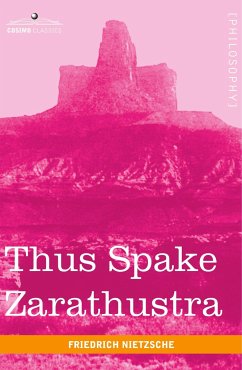
Thus Spake Zarathustra
Versandkostenfrei!
Versandfertig in 1-2 Wochen
33,99 €
inkl. MwSt.

PAYBACK Punkte
17 °P sammeln!
The most well-known of Nietzsche's works, Thus Spake Zarathustra spells out a philosophy where God is dead and is replaced by the "Superman", a human of incredible power that rules over humanity. A series of discourses also explains how life should be lived out and what things should be important in all our lives. This work, although controversial, has impacted our society in many ways, often without us even knowing it.















